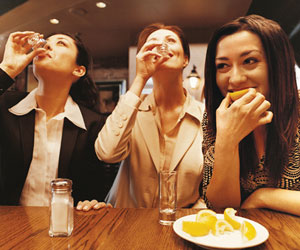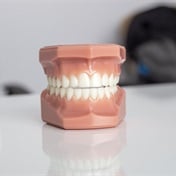Alcohol not only makes you more susceptible to the lure of a double cheeseburger with chips and onion rings, but most of the tipple carries a hefty kilojoule load.
Dietician Amanda Weber-Perfett helped us shed light on where those extra kilos could be coming from:
Beer (lager): 544 kilojoules (130 calories) per 340 ml can
Cider: 996 kilojoules (238 calories) per half litre
Liqueur: 285 kilojoules (68 calories) per tot (25 ml)
Port: 289 kilojoules (69 calories) per double tot (50 ml)
Rum/gin: 264 kilojoules (63 calories) per tot (25 ml)
Sherry (dry/medium): 222 kilojoules (53 calories) per 50 ml
Sherry (sweet): 289 kilojoules (69 calories) per 120 ml
Brandy/whisky: 264 kilojoules (63 calories) per tot (25 ml)
Wine (dry red/dry white): 360 kilojoules (86 calories) per glass
Wine (medium/sweet white): 427 kilojoules (102 calories) per glass
Strawberry daiquiri: 464 kilojoules (111 calories) per drink
It's not all bad news
If you drink in moderation, within the recommended limits, alcohol's not necessarily bad for you; and it could even have some benefits.
"The consensus of opinion is that moderate drinkers appear to live longer and have less incidence of coronary heart disease (CHD) than people who don't drink," says nutritionist, Reni Burgi. "The link between lower risk of CHD and alcohol intake has been found in several international studies. These benefits appear to be linked with polyphenolic compounds found in alcohol: flavonoids such as quercetin and resveratrol in red wine for example."
Reni also mentions that red wine is probably the "healthiest" alcoholic drink (because of the concentration and type of polyphenols in the grape skins), but that all alcohol in moderation gives protection against CHD by reducing the levels of "bad" blood cholesterol LDL (low density lipoproteins) and increasing the "good" kind, HDL (high density lipoproteins).
Tips to help you reduce your alcohol intake:
Remember that food slows down alcohol absorption.
Try not to drink anything alcoholic before you start to eat; drinking on an empty stomach will rapidly cause a rise in your blood alcohol levels.
Don't start the evening by quenching your thirst with alcohol. Rather quench it with water. You will find that you drink much more slowly as a result.
Alternate your alcoholic drinks with a glass of water. This will not only help you drink less alcohol, but will prevent you from becoming dehydrated.
Don't think that strong coffee, a run around the block, drinking water or taking vitamin C will help you "sober up". Once alcohol is in your body, nothing can do this except time.
Have any tips of your own? Share them in the comment box below.
We live in a world where facts and fiction get blurred
Who we choose to trust can have a profound impact on our lives. Join thousands of devoted South Africans who look to News24 to bring them news they can trust every day. As we celebrate 25 years, become a News24 subscriber as we strive to keep you informed, inspired and empowered.





 Publications
Publications
 Partners
Partners















